Why this sports organizer finally decided to leave Meetup and the platform that saved his group
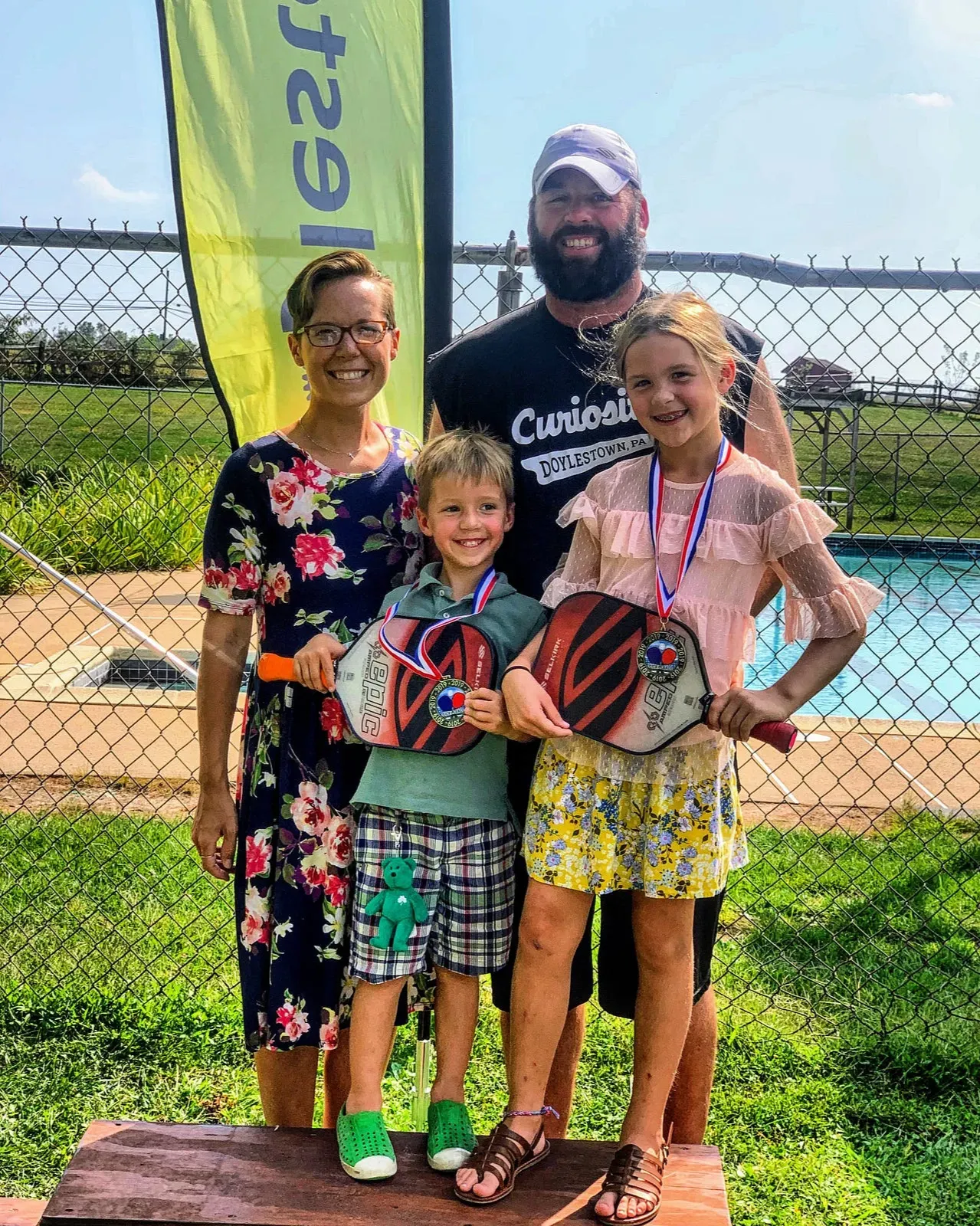
Jeremiah Thomas runs his pickleball group at the most unlikely of places — his third generation farm and home in Doylestown, Pennsylvania. Although several farm animals including goats, sheep & horses can be found trotting around the 55 acres, this is not your average farm with hundreds of grazing animals or endless rows of produce. This is Camp Curiosity, a 50+ year old private pre-school and children’s camp, that has recently brought fun for adults as well. With dozens of courts and fields to support hockey, basketball, tennis, lacrosse, soccer and now pickleball, I can’t help but imagine a lush outdoor wonderland of sports; a campus that brings people of all ages together to explore, learn, and have fun.
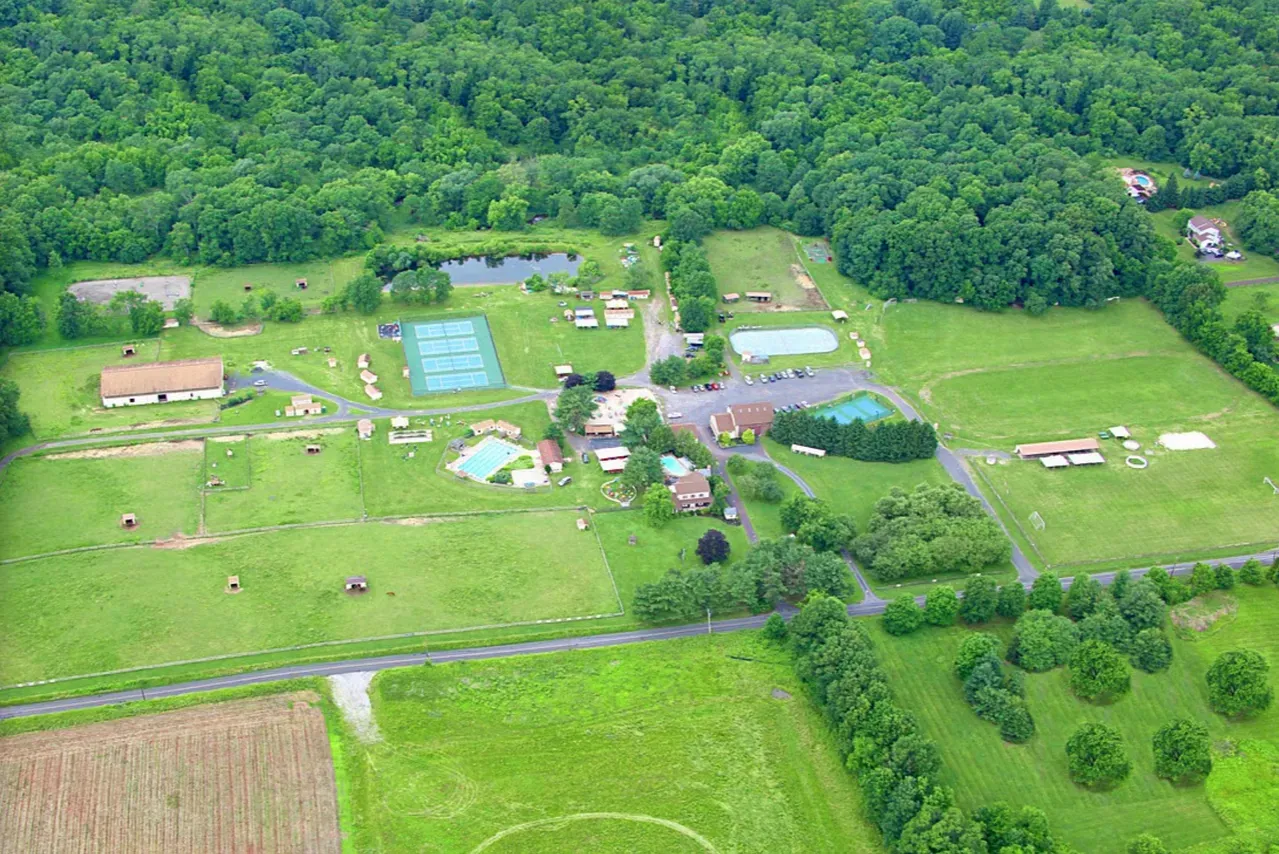
Jeremiah and I spoke through video-call. He was late for our interview, with good reason, as he apologetically explained to me that he had to help change someone’s tire; not an a-typical occurrence in his chaotic days.
Jeremiah’s life on the farm seemed so different from my city life in Toronto. Moreover, his prominence in the pickleball community seemed at odds with the stereotype of pickleball as a predominantly seniors sport played in South Florida and other retirement communities. I sat back and listened intently as Jeremiah told me the story of the rise and frustration of his beloved pickleball club, his belief in himself in the face of difficult decisions and resistance to change, and the platform that helped preserve his group.
When one door closes, another opens
As a young adult and into adulthood, Jeremiah was an accomplished tennis player and coach. Typically, tennis players don’t transition into pickleball until they are several decades older than Jeremiah, but in the fall of 2015, he had a devastating injury and blew his knee while playing basketball. Desperate to get back into sports when it was time to rehab, he googled “Things like tennis” and found pickleball, a sport that allowed him to be competitive but with much more limited mobility. For this reason, pickleball is especially popular amongst seniors.
When Jeremiah decided to try his hand at pickleball, he found a club 20 minutes down the road and started learning to play at their outdoor park. Although he was really enjoying his play, Jeremiah who was balancing a family with work found it difficult to play during the morning or early afternoon hours. Over the following winter of 2016, Jeremiah decided that if he wanted to continue playing, he had to start his own club, which he called Doylestown Pickleball Club.
A call to adventure: Building his own club
With a conviction to launch his club, and the broad ranged skill set of a business owner, summer camp director, growing up on a farm, and a strong practical understanding of software and technology, Jeremiah got to work. He chalk-lined and taped his outdoor tennis courts in the summer of 2017 and kicked things off with 3 members. Undeterred, he would promote his group through his social media networks, posting to his large tennis following, “Hey, I stopped playing tennis, do you want to come learn about pickleball?” Over that summer, Doylestown Pickleball Club grew to 25 members.
As the summer turned to fall, and the nights became cooler, Jeremiah had 25 members who needed an indoor space to play in. He took his negotiation skills to the tennis club where he used to play and practice as a junior, they agreed to allow him to bring pickleball in the coveted space, and in the winter of 2017/2018, Doylestown Pickleball Club grew to 170 members.
The software that Jeremiah was using to manage events and RSVP’s was Meetup, a popular platform for “finding and building local communities.” He enjoyed the wide reach that Meetup offered, bringing hundreds of users into his Meetup group. However, he was growing increasingly frustrated with the technical and community based challenges he was facing with Meetup.
Something was boiling under the surface
Over the next year and a half, growth did not slow down. To keep up, Jeremiah painted permanent lines on hybrid tennis courts; converted their horseback riding arena into an indoor pickleball gym with 5 indoor courts, started hosting tournaments, and built even more outdoor courts for a total of 12 outdoor and 5 indoor pickleball courts on his property. “Everybody thought I was nuts,” Jeremiah reminisces about his decision to convert their horseback riding facility into an indoor gym to accommodate the courts.
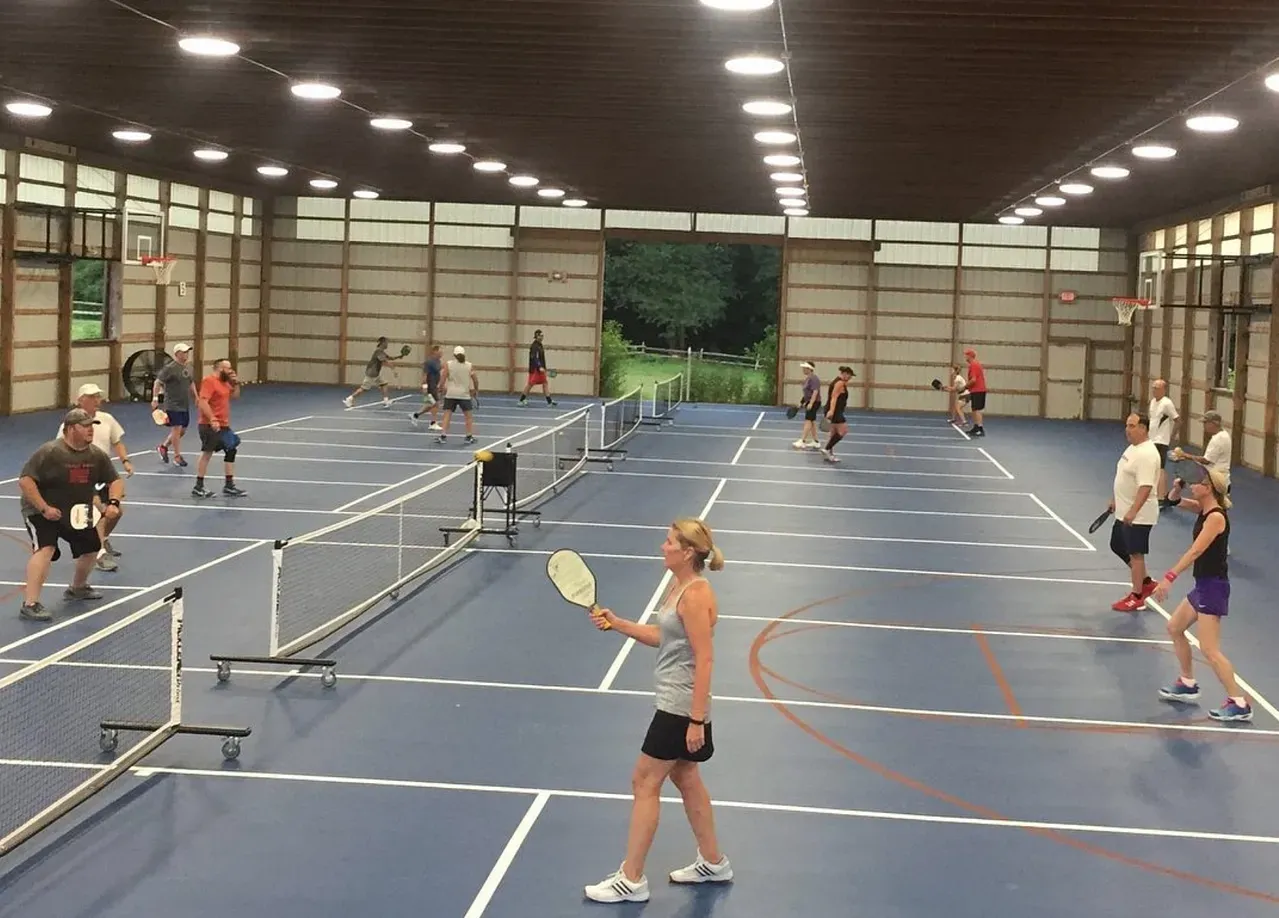
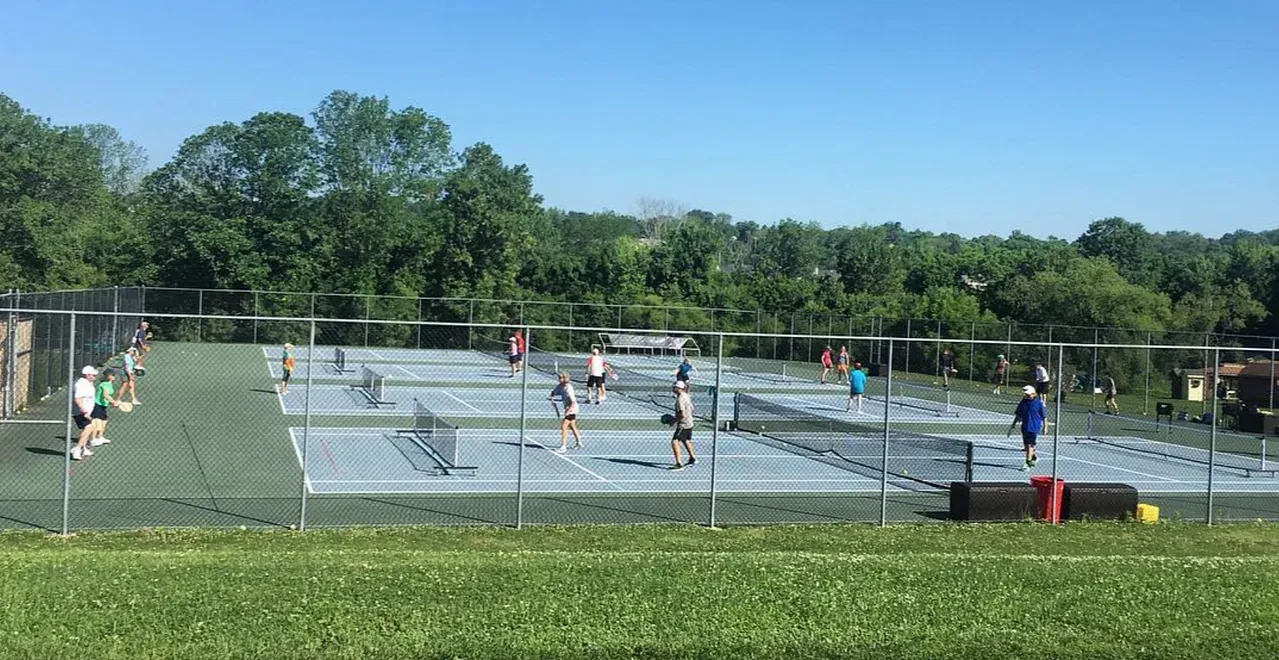
By the fall of 2019, Doylestown Pickleball Club had about 1000 players in their Meetup group, 260 of whom were paying club members, and had enough infrastructure on property to support all of the club’s games.
Although growth was steady, and it seemed like Jeremiah had built his dream indoor and outdoor facility, he was struggling to find the enthusiasm he once had. The software that he was using to market his group, post games, and track attendance was becoming a large source of stress. He expressed to me,
“Meetup took the joy out of organizing.”
Jeremiah resisted switching platforms in the past because he didn’t want to frustrate everybody, because he liked the way the numbers were growing on Meetup. “We were at 1000 members on Meetup at one point, but I was like, ‘How many of them are actually here?’ Thats when I was like, ‘Do I want 1000 names of people that aren’t here, or do I want to know those 200 people that come?’”
The illusion of boundless growth and reach
Normally, organizers preach about Meetup’s large user base, in fact, that’s the main reason why they stay on the platform, so I was especially intrigued when Jeremiah began to explain the fallacy of Meetup’s traffic and reach:
“Meetup became, I guess, too accessible. People would say to other people, ‘Go onto Meetup,’ and then they would just sign up and show up. And what would happen is, they wouldn’t read any of the information about the club, or where to go, or to drive 5 miles an hour for safety of animals and patrons. They would just bypass it.”
Technical challenges: Notification overload and the waitlist
“A big thing that everyone hated was Meetup sent so many notifications…There’s 4 pickleball groups within 10 miles of each other that everyone is signed up for on Meetup, so everyone would turn the notifications off, because you’re getting hit by all of those notifications, maybe 10–12 times a day. And then no-one knew what was going on.”
Jeremiah also explained to me, “Meetup’s waitlist was a disaster. People would cancel their spot and it would just automatically move people on the waitlist into the positions whether they knew it or not. So it would show 25 people are coming, and the event would start, and only 12 would show up because the rest had no idea that they were moved over.”
Pricing and administrative burden
“I was frustrated because it was difficult to deal with a lot of the admin. Basically, players would sign up and they would bring cash day-of. So I never played but I had to go over every day to check people in and collect dues.”
I pressed Jeremiah and asked, if it was such a struggle to collect cash, why didn’t he collect payment online through Meetup?
With a tint of exasperation in his voice, Jeremiah replied, “7.5% (+ 50 cents)?! And the membership fee! It was kind of like a triple dip…I did it for a while and I was like, ‘Wow I have to charge $15 a visit just to make it worthwhile?’
In the end, Jeremiah realized that if he had to charge $15 to cover his fees and Meetup’s fees, no-one would show up. He currently charges $10 a visit, or $5 a visit with $50 a yr membership.
Ready for change
“Meetup was a disaster and in October 2019, I paused everything and said, I’m not going to continue this group anymore if I’m not enjoying it. I needed to take a vacation from something I once enjoyed.”
Ready to pull the plug on Meetup, Jeremiah closed his club for an entire week while he tried out dozens of software he found through his “Alternatives to Meetup” google search. “I literally pretended I’m on vacation and I don’t exist.”
Finally, Jeremiah found OpenSports and started talking to the team: “I set up my groups, and then threw it out there (to my members) the next day and said, ‘We are no longer on Meetup. If you’re interested in playing, you have to use this new software.’”
Members who resisted the transition
“These are the rules, this is how we have to do it.”
Most organizers are worried about their members getting upset and going elsewhere in the face of change. When I asked Jeremiah about how he managed this inevitable resistance to change, he told me that if he tried to listen to everybody, he would go crazy:
“With this app, OpenSports, the members seem to get it better. I’m all for it, you know, I love the changes that we’re making. So I said, ‘Look, if you don’t like it and you’re okay not joining my club, I’m okay with that.’ That’s how you have to be at some point, for the best interest of everybody, you have to say, ‘These are the rules, this is how we have to do it.’”
Switching from cash-based payments to online
“I’ve gained sanity. It’s very difficult to put a price on that.”
With a true belief in the changes he was making, and a desire to streamline the admin side of his pickleball club, Jeremiah switched from a cash-based system to online payment collection through OpenSports. He is happy to pay the transaction fees as he noted, “Instead of having an employee, you guys have essentially become my employee; being able to refund, monitor, and notify people on the waitlist when there’s a spot available. I was doing all of that before…”
Further reflecting on the no-show problem that ensued from Meetup’s waitlist, Jeremiah said: “When 10 people didn’t even know they got a spot, that’s untapped revenue. Even though I’m paying you guys (through transaction fees), you’re well earning it.”
Drumming up excitement and mitigating challenges
Besides having to grandfather over his members who had already bought memberships through other forms of payment or meetup, Jeremiah noted that one of the only challenges he faced during the transition was related to the technology not coming easy for some patrons. In order to commemorate the launch of a new platform, and to assist the members who were having trouble, Jeremiah threw a mini-meetup to say, “Come out and we’ll help you set up OpenSports on your phone!”
Relinquishing control: “OpenSports kept the group alive”
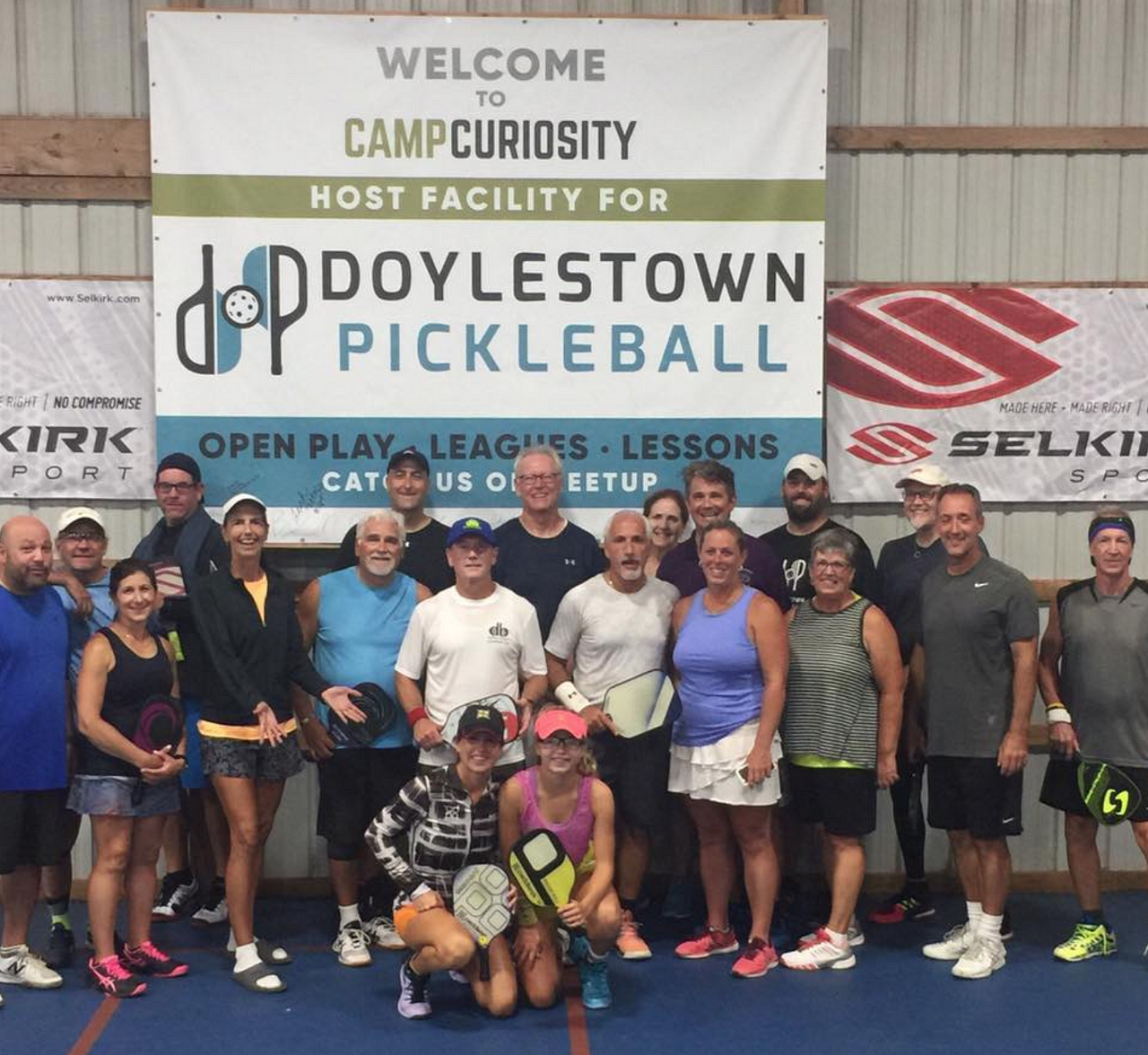
Switching platforms meant that Jeremiah started from scratch again with zero members in his Doylestown Pickleball Group on OpenSports. Jeremiah created 4 different groups on OpenSports: One is for lessons, one group for all of their events and tournaments, one for indoor play and one for outdoor play. Now, two months after launching, he is back up to 250 members in his indoor group.
“OpenSports makes managing the group almost ‘fun’. You can see growth, with contests to see who visits the most. Accepting payment and refunds has been a breeze. Even the app that comes with the credit card processing allows you to chart your growth and see week to week how your group is doing.”
Doylestown Pickleball Club is a community of individuals who come together to be active, have fun, and enjoy one another’s company. They are a great group of people, brought together by their love for the sport, and further bound by a special camaraderie. They step up to help one another, and more often than not, support each other’s decisions. Jeremiah shared, “The friendships that I’ve made from this group are irreplaceable,” and I can tell just how important this club and the people are to him.
Jeremiah didn’t resist sharing some heartfelt praises during our call that had me holding back tears:
“What you guys are doing is life-changing, and I really appreciate it. Each update you’ve made has been a breath of fresh air!”
Stories like this truly motivate us to continue to push our platform to the next level, so that we can support sports organizers like Jeremiah who deserve a better system to power their amazing sports group. Thank you for sharing your story with us, Jeremiah!
Thank you for reading! If you liked this story or would like to move your pickup/drop-in/social sports group to OpenSports, message us!
Questions? Send them our way: support@opensports.net